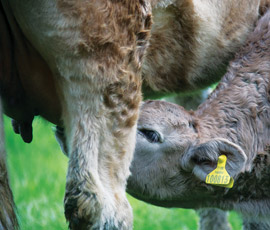Vaccinate calves prior to sale this autumn, farmers told

Suckled calf producers are being encouraged to vaccinate their spring born calves for pneumonia prior to sale this autumn following a poor start to the year.
Basil Lowman from Scotland’s Rural University College (SRUC) says many calves born this spring may not have received adequate colostrum, with many cows left thin by poor forage supplies.
“Cows aren’t milking due to low grass levels, so this autumn we are going to end up with light calves being weaned with low levels of resistance. I have never known a year when vaccinating for pneumonia will be so critical,” he says.
And there is a financial benefit for both the buyer and seller in vaccinating calves for pneumonia prior to sale, according to figures from the certification programme SureCalf.
SureCalf is a free scheme between sellers of weaned suckler calves/store cattle that have received vaccine protection from pneumonia before sale, and their buyers. The scheme was launched with a pilot programme with United Auctions in 2007 and has now been rolled out to 11 auction marts across the UK.
SureCalf
- SureCalf is a free of charge self certified scheme
- Last year more than 5,000 suckler calves enrolled
- Farmers received average premiums of 12p/kg
- Hoped more auction marts and producers get involved in 2013
- More information at www.surecalf.co.uk or call 0800 668 1886
Last autumn, three United Auction sales saw buyers pay a 12p/kg liveweight premium for SureCalf cattle over non-SureCalf, worth £36.47 a head on average. Sixteen percent of calves sold at the sale were on the programme.
Dr Lowman describes the scheme as a “win-win” for both buyers and sellers.
“The scheme means calves will be fully protected, they are unlikely to get pneumonia, will grow well and will leave the farmer a profit, ” he says.
Carolyn Hogan a vet for animal health company Zoetis, says the programme is designed to improve cattle performance and welfare by minimising the incidence of respiratory disease after sale.
“When calves are sold in autumn there are unavoidable stresses such as mixing, transport and moving, so the risk of respiratory disease is there. A trial of 500 animals found all animals with respiratory lung damage weighed on average 20kg less.”
The scheme ensures that protection against pneumonia is in place before the challenge arises. This means calves must be more than 12 weeks of age when first vaccinated, receiving two doses three to four weeks apart. The second dose should be administered no later than two weeks prior to sale and not earlier than eight weights prior to sale. “This ensures the vaccine will be working by the time cattle arrive on farm and will cover them over the housing period,” says Ms Hogan.
Beef farmer Paul Westaway who farms 100 Aberdeen Angus cross Holstein calves on the Blade Scheme says he would not buy an animal that hadn’t been treated for pneumonia.
“In the past, if I’ve had to intervene on any beef calf for pneumonia they automatically drop a grade. That means, if there’s a drop from an R4L to an O+ that is a loss of £45 alone without the cost of pneumonia treatment.”
Get more information on reducing calf losses with the Farmers Weekly‘s Stop the Loss campaign
